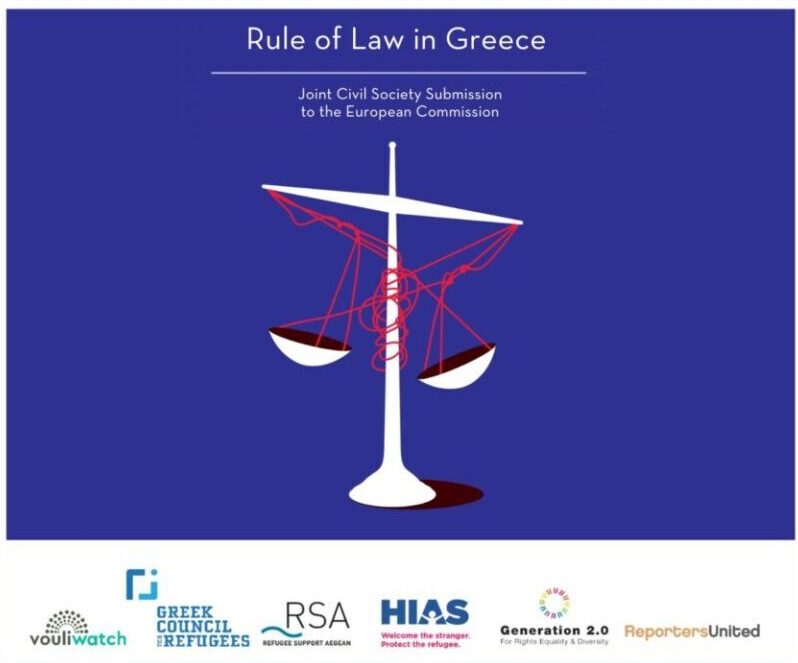Rule of law backsliding continues in Greece

The Civil Society at the initiative of Vouliwatch is submitting a report to the European Commission for this year’s report on the Rule of Law (2023). Generation 2.0 RED contributed to this report on immigration policy and citizenship. In particular, we highlighted the long-term deficiencies in the issuance of administrative acts to determine statelessness and the access of second-generation children with disabilities to the acquisition of Greek citizenship.
In recent years, Greece has witnessed an alarmingly systematic democratic regression – which has been documented in a number of recent reports by international organisations and institutions, including the European Commission – and which poses a direct threat to the fundamental values of our constitution and the principles espoused by the European Union.
The independent organisations, Vouliwatch, Greek Council for Refugees (GCR), Refugee Support Aegean (RSA), HIAS Greece, Generation 2. 0 for Rights, Equality & Diversity and Reporters United, in the context of concerns about Greece’s systematically problematic approach to key aspects of the rule of law, democracy and fundamental rights, have compiled a list of indicative violations of the rule of law in Greece for the year 2022.
In this report we highlight and bring to the attention of the European Commission, cases where Greece has failed to comply with the principles of the rule of law in the areas of:
- The justice system (issues with the independence, the quality and the speed of the justice system)
- The fight against corruption, (issues with (a lack of) prevention measures; transparency and accountability of political money; audit institutions; public procurement & direct awards; lack of protection for whistleblowers etc.)
- Freedom of the press (cases of government or political interference in the media; issues with the transparency and ownership of media outlets, and a lack of transparency in state advertising; a lack of pluralism at the Athens News Agency, and the intimidation of journalists – through police intimidation or legal actions (SLAPPs), as well as the state surveillance of journalists)
- Good legislation (the unlawful restriction of consultation periods; the misuse of amendments; the failure to adopt delegated acts; the discriminatory application of COVID-19 pandemic response measures & fines- such as against refugees)
- The independence of the Independent Authorities (the limitation of the resources and powers of the Ombudsman and audit institutions; the questioning of their constitutional mandate and the serious lack of effectiveness of their investigations, including national issues such as the use of illegal spying software or illegal push backs)
- The lack of institutional support for civil society (such as arbitrary and disproportionate registration requirements for NGOs working with refugees and migrants, a hostile media narrative and the criminalisation of NGOs and human rights defenders)
- And finally, the gradual undermining of the culture of the rule of law through the direct or indirect denigration of international and EU institutions and investigating bodies
Our report features striking cases of rule of law violations in Greece during 2022, and demonstrates the existence of a serious threat to the principles of the rule of law as well as the democratic acquis more generally in our country.
We examine cases such as the Greek government’s failure to uphold the constitutionally guaranteed inviolability of the confidentiality of communications through cases where the illegal spyware Predator has been used, as well as through cases where journalists and politicians have been surveilled (#Koukakis #EYP #Androulakis); the failure of the executive to investigate these cases and the blatant obstruction by the government of the independent authority’s investigation of these cases; the disappearance of asylum seekers through illegal refugee push backs, and the targeting of NGOs and human rights defenders; the unprecedented non-compliance with the injunctions issued by the ECtHR, in particular regarding the assistance and rescue of third country nationals facing imminent danger at the Greek borders; restrictions on the practice of the legal profession; the widespread legal attacks increasingly faced by journalists (especially through SLAPP cases); issues with the submission and auditing of asset declarations and the transparency of party funding; the limited protection offered to whistleblowers; cases of unlawful police violence; non-compliance with EU regulations and indifference to the recommendations of the Ombudsman or monitoring bodies; the extensive use of direct awarding of public contracts and the lack of transparency in the distribution of state advertising funds related to the pandemic (the Petsas List case and the role of the National Transparency Authority); and finally the failure to observe good legislation practices as for example, in the indiscriminate insertion of last-minute and irrelevant amendments to bills about to be voted on in Parliament.
We invite you to read the full report and share this initiative, as we must collectively defend the values of the Rule of Law and resist their encroachment, before citizens’ trust is irreparably damaged with grave consequences for European values and Democracy.
Read the full report here:
Joint Civil Society Submission to the European Commission on the 2023 Rule of Law Report
Co-signatory organizations
Generation 2.0 for Rights, Equality & Diversity

 Ελληνικά
Ελληνικά

